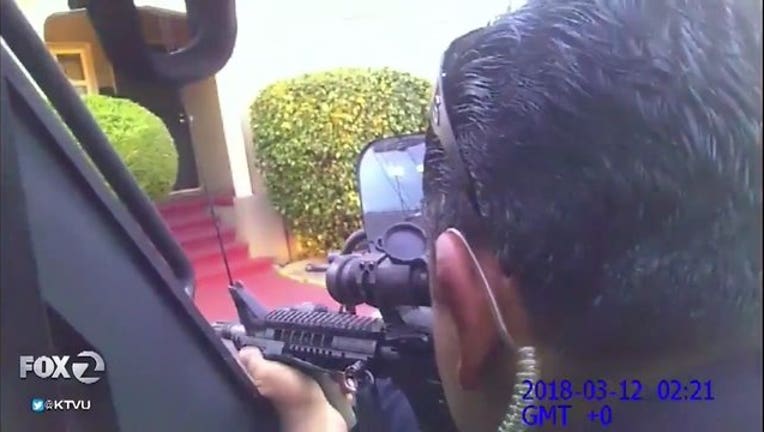Oakland Police Commission rejects its own 'tainted' investigative report on homeless man's death

A federal civil rights lawsuit has been filed against four Oakland police officers on behalf of the mother of a man shot dead by the officers last year, the plaintiff's attorney said Tuesday.
OAKLAND, Calif. (KTVU) - The Oakland Police Commission on Thursday unanimously rejected a report conducted by its own investigators who ended up exonerating four officers who killed a sleeping, homeless man last spring when he woke, holding a gun in his hand.
Chair Regina Jackson said sending the report back signals a vote of no confidence from her commission, which was voted into power in 2016 and is intended to provide civilian oversight of the police department. But about two years after its formation, the commission, which is made up of appointed volunteers in the community, has no Inspector General, executive director and is missing several key investigator positions.
"We must return the report," Jackson said at the meeting, calling it "tainted" and saying "basic procedures were not followed."
The Community Police Review Agency found that the four officers who killed Pawlik did not violate department policy when they opened fire on him when he awoke with a gun in his hand on March 11, 2018. The officers said they feared for their life. The CPRA investigator also found that two superiors failed to properly oversee and manage the situation but did not recommend termination.
The commission isn't necessarily upset with the findings, perse, but the process: The CPRA investigator, a civilian, relied on the police department's investigation into Pawlik's shooting.
It's for that reason that Jackson noted that the report is "flawed in many respects:" Only one interview was conducted and the CPRA investigation violated the law, she said, when separate, videotaped interviews were not conducted so that now, the public has no way of seeing the quality of the investigation.
It's unclear why a separate investigation was not conducted.
Larry White, a member of the Coalition for Police Accountability, said he can only surmise why the CPRA didn't do its own investigation: He believes that it was part of the agency's previous culture to accept police findings as gospel, and that is what the investigators are doing now.
The goal of the CPRA (formerly the Citizens' Police Review Board) is to "improve police services to the community by increasing understanding between community members and police officers." The agency is supposed to investigate police behavior independently and report back to the civilian commission.
But Jackson said that definition is "de jure" but not "de facto," meaning there is what is supposed to happen and what actually does happen.
Civil rights attorney Jim Chanin took it a step further.
"CPRA has shown themselves to be so corrupt, they're incapable of making an objective finding," he said. "Police knew about CPRA's findings months ago, and you were not informed until the day the CPRA findings were made public. This is not an investigative report, but a brief in support of the police department. It is totally wrong." He also called the investigators "bad" and "incompetent."
The Oakland Police Department on Friday referred questions to the city administrator's office, which did not immediately respond for comment.
In an email, Mayor Libby Schaaf's spokesman, Justin Berton, said: "The Police Commission is the community’s eyes, ears, and voice in this process. It’s critical for them to ensure their investigation was conducted in a thorough and transparent manner.”
In contrast to the CPRA report, Federal Monitor and Compliance Director Robert Warshaw, who has official oversight over the police department, found several errors on the day that Pawlik was killed: Most notably, that there was no plan to address the fact that Pawlik, who had a gun on his lap, would wake up and inevitably start moving. He said the four officers involved violated the department’s lethal use-of-force policy, and he also specifically called Police Chief Anne Kirkpatrick’s clearing of her officers “disappointing and myopic.”
Since Warshaw's findings, Sgt. Francisco Negrete and Officers William Berger, Brandon Hraiz and Craig Tanaka have been on administrative leave.
Sgt. Barry Donelan, president of the Oakland Police Officers Association, told the Bay Area News Group, that the CPRA exonerations should result in the officers being returned to active duty as soon as possible.
“For over a year this incident has been the subject of public debate that resulted in the unfair criticism and ridicule of these officers,” Donelan said. He noted the district attorney and police department’s previous findings and said despite that “These officers who risked their lives, suffered the public abuse of critics, cooperated with multiple investigations and have been completely vindicated, inexplicably they have not been returned to duty.”
But the Oakland Police Commission does not necessary agree. The civilian commissioners also unanimously voted to subpoena all communication between CPRA investigators and the police department starting from the day Pawlik was killed until the present day.

